apache-ignite简介(一)
1,简介
ignite是分布式内存网格的一种实现,其基于java平台,具有可持久化,分布式事务,分布式计算等特点,此外还支持丰富的键值存储以及SQL语法(基于h2引擎),可以看成是一个分布式内存数据库。
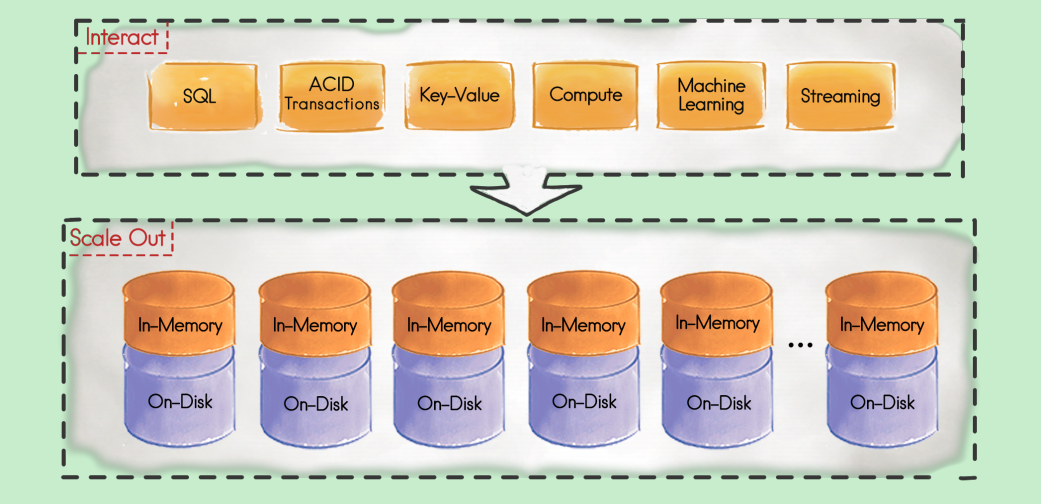
与ignite类似的产品有gemfire(12306目前正在使用),其开源版为geode。与gemfire相比,ignite对sql的支持比较完善,提供了数据并置来提升性能,还有对分布式事物的支持以及对spring的集成都比较友好,很方便进行嵌入式集成进应用服务。
2,基本使用
ignite有两种使用方式: 一种是从官网下载release版本程序,解压运行部署,另外一种是通过嵌入式集成进现有应用程序。
2.1,官网二进制release版本的使用
下载地址:https://ignite.apache.org/download.cgi
下载后得到apache-ignite-fabric-2.3.0-bin.zip压缩包,解压后进入bin路径:
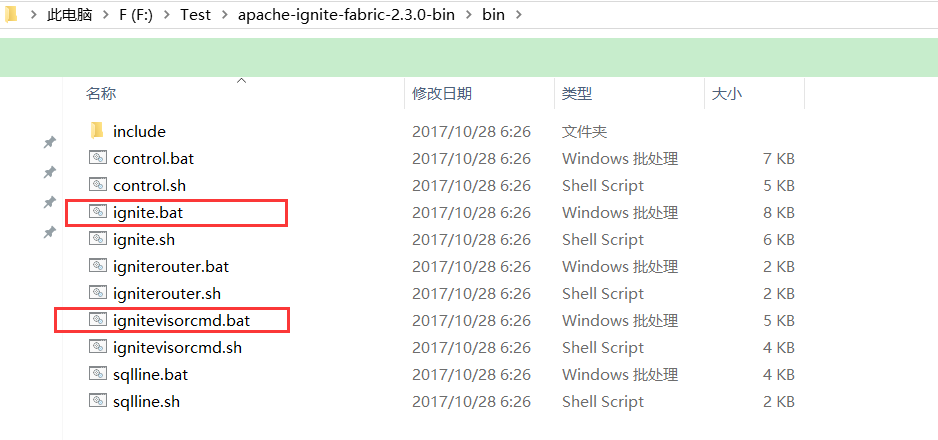
主要用到两个脚本: ignite.bat 启动脚本, ignitevisorcmd.bat监控脚本
执行ignite.bat脚本即可启动一个ignite服务
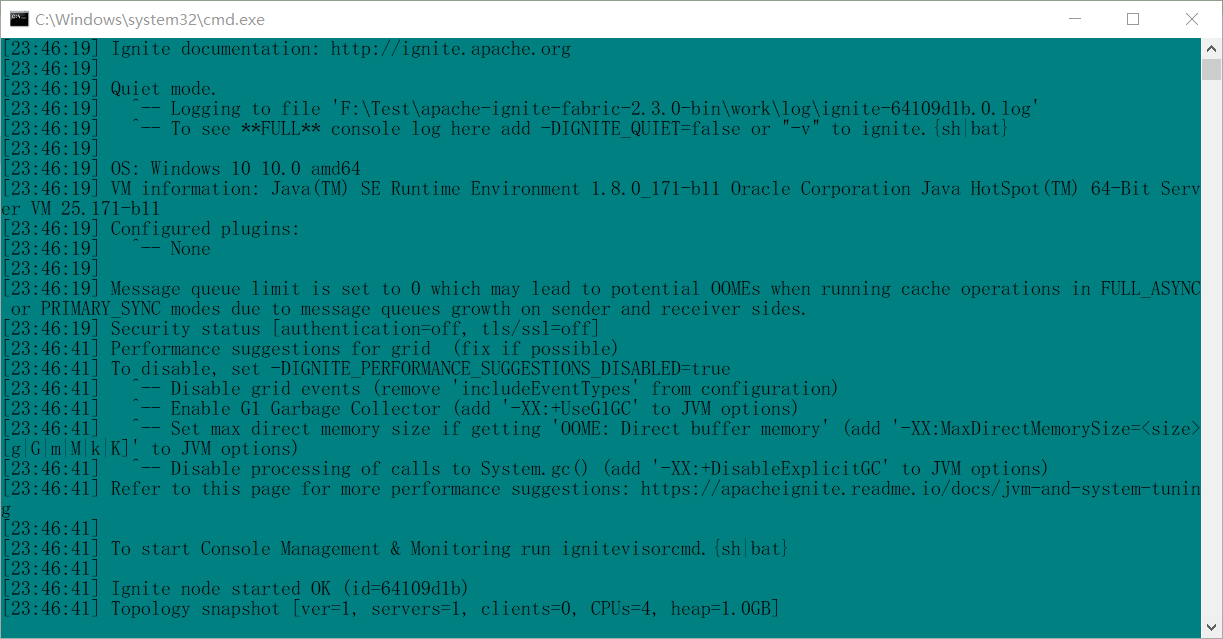
执行ignitevisorcmd.bat可以进入监控命令界面:
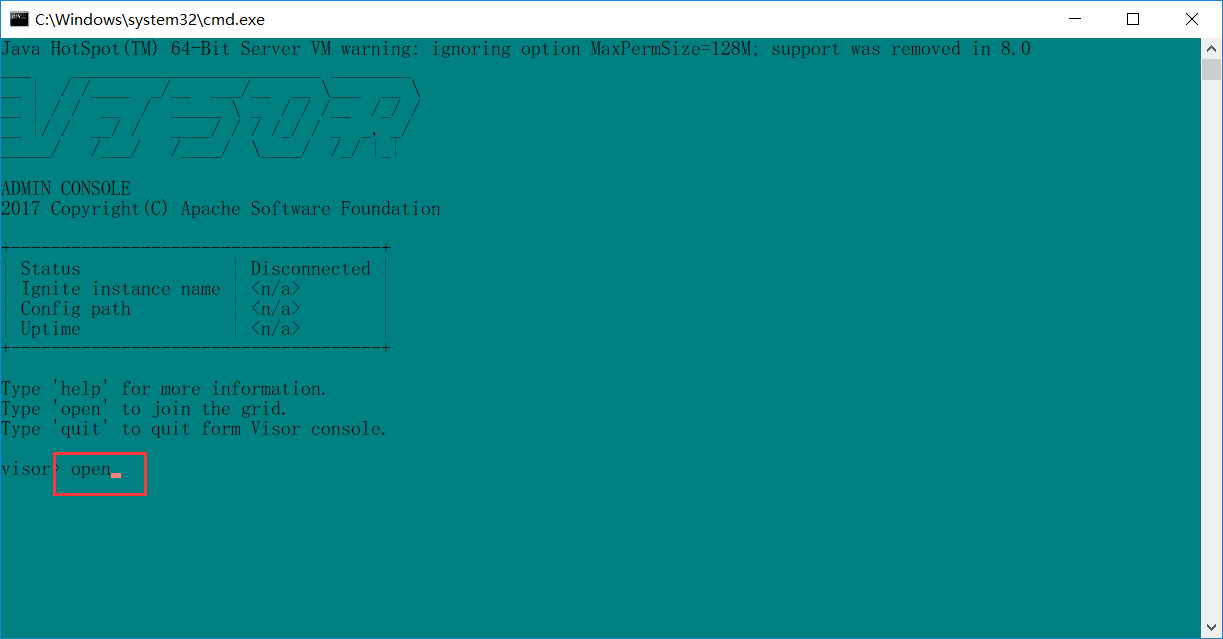
输入open命令选择配置文件,这里选择默认的0 | configdefault-config.xml输入数字0即可
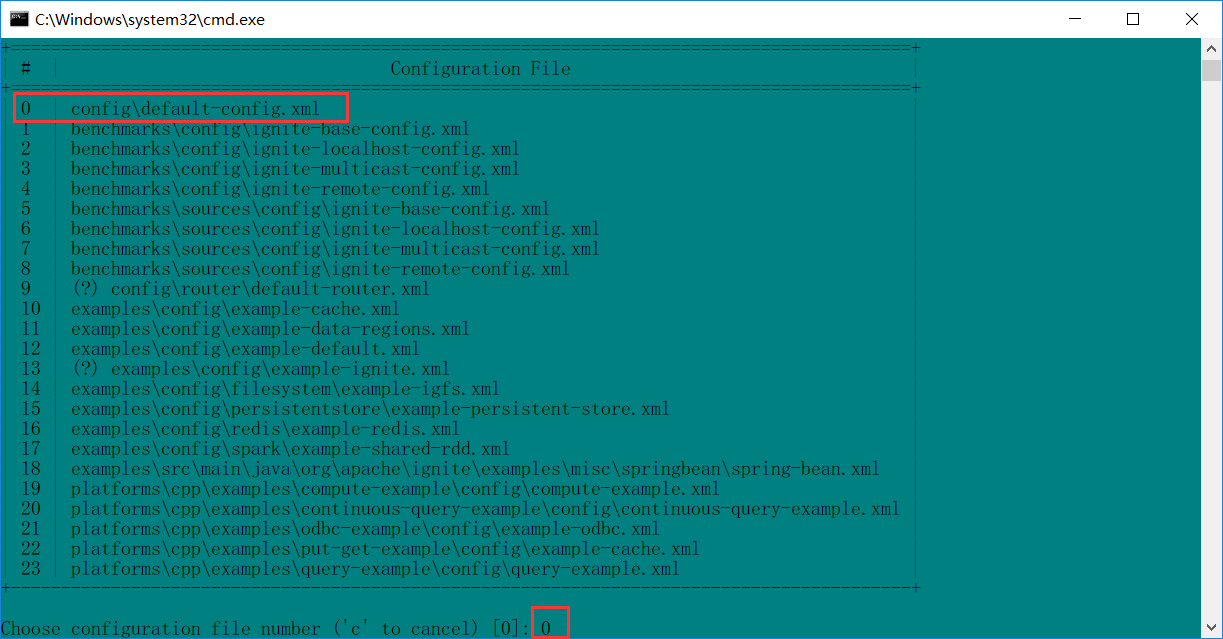

常用命令如下:
| 命令 | 功能 |
|---|---|
| top | 查看集群网络拓扑图 |
| cache | 查看整体缓存情况 |
| config | 查看节点配置 |
| open | 打开一个配置文件连接集群 |
| close | 关闭该连接 |
更多详细命令可以通过输入help命令查看命令帮助(输入help回车)。
2.2,java服务使用ignite客户端访问ignite集群
通过JAVA服务使用已启动的ignite集群,JAVA服务可以使用客户端模式(Client),应用端不存储数据,或者使用服务端模式(Server)变成一个节点加入现有ignite集群,则应用端会缓存部分数据。如果是使用服务端模式的话,整个集群其实都可以使用应用节点组成集群,也就是上面所说的嵌入式集成。这样可以对节点进行定制化处理,更为灵活。
这里使用Client模式演示一下简单使用:
1) 添加相关依赖
<dependency>
<groupId>org.apache.ignite</groupId>
<artifactId>ignite-core</artifactId>
<version>2.3.0</version>
</dependency>
<dependency>
<groupId>org.apache.ignite</groupId>
<artifactId>ignite-spring</artifactId>
<version>2.3.0</version>
</dependency>
2) 定义配置文件
default-config.xml
<beans xmlns="http://www.springframework.org/schema/beans"
xmlns:xsi="http://www.w3.org/2001/XMLSchema-instance"
xmlns:util="http://www.springframework.org/schema/util"
xsi:schemaLocation="
http://www.springframework.org/schema/beans
http://www.springframework.org/schema/beans/spring-beans.xsd
http://www.springframework.org/schema/util
http://www.springframework.org/schema/util/spring-util.xsd">
<bean id="igniteCfg" class="org.apache.ignite.configuration.IgniteConfiguration">
<property name="clientMode" value="true"/>
<property name="discoverySpi">
<bean class="org.apache.ignite.spi.discovery.tcp.TcpDiscoverySpi">
<property name="localPort" value="48500"/>
<property name="localPortRange" value="20"/>
<property name="ipFinder">
<bean class="org.apache.ignite.spi.discovery.tcp.ipfinder.vm.TcpDiscoveryVmIpFinder">
<property name="addresses">
<list>
<value>127.0.0.1:48500..48520</value>
</list>
</property>
</bean>
</property>
</bean>
</property>
<property name="communicationSpi">
<bean class="org.apache.ignite.spi.communication.tcp.TcpCommunicationSpi">
<property name="localPort" value="48100"/>
</bean>
</property>
</bean>
</beans>
3) 启动ignite客户端并实现简单数据存取
ClientStartApplication.java
@SpringBootApplication
@ImportResource(locations={"classpath:default-config.xml"}) //ignite配置文件路径
public class ClientStartApplication implements CommandLineRunner {
@Autowired
private IgniteConfiguration igniteCfg;
public static void main(String[] args) {
SpringApplication.run(ClientStartApplication.class,args);
}
/**启动完成之后执行初始化*/
@Override
public void run(String... strings) {
//启动ignite服务
Ignite ignite = Ignition.start(igniteCfg);
//创建cache
IgniteCache<String, String> cache = ignite.getOrCreateCache("test");
//存入数据
cache.put("cord", "hello");
//查询数据
System.out.format("key[%s]->value[%s]
", "cord", cache.get("cord"));
}
}
执行结果如下:
[15:46:44] Ignite node started OK (id=48cfd9ce)
[15:46:44] Topology snapshot [ver=30, servers=1, clients=1, CPUs=4, heap=2.7GB]
key[cord]->value[hello]
通过ignitevisorcmd.bat查看当前集群状态与缓存情况:
visor> cache
(wrn) <visor>: No caches found.
(wrn) <visor>: Type 'help cache' to see how to use this command.
结果发现没有数据,这是因为默认的configdefault-config.xml其实配置是空的,执行ignite.bat启动服务虽然也是用这个文件,但是因为有默认值,所以不影响,但是监控程序ignitevisorcmd.bat必须要根据配置文件才能连接访问集群信息,因此按如下所示修改configdefault-config.xml:
(其实就是在上面的default-config.xml中去掉了<property name="clientMode" value="true"/>这一项)

<beans xmlns="http://www.springframework.org/schema/beans"
xmlns:xsi="http://www.w3.org/2001/XMLSchema-instance"
xsi:schemaLocation="
http://www.springframework.org/schema/beans
http://www.springframework.org/schema/beans/spring-beans.xsd">
<bean id="grid.cfg" class="org.apache.ignite.configuration.IgniteConfiguration">
<property name="discoverySpi">
<bean class="org.apache.ignite.spi.discovery.tcp.TcpDiscoverySpi">
<property name="localPort" value="48500"/>
<property name="localPortRange" value="20"/>
<property name="ipFinder">
<bean class="org.apache.ignite.spi.discovery.tcp.ipfinder.vm.TcpDiscoveryVmIpFinder">
<property name="addresses">
<list>
<value>127.0.0.1:48500..48520</value>
</list>
</property>
</bean>
</property>
</bean>
</property>
<property name="communicationSpi">
<bean class="org.apache.ignite.spi.communication.tcp.TcpCommunicationSpi">
<property name="localPort" value="48100"/>
</bean>
</property>
</bean>
</beans>
再重新启动ignitevisorcmd.bat并open修改后的configdefault-config.xml:
执行top命令,可以看到两个节点的类型是不同的:
visor> top
Hosts: 1
+=================================================
| Int./Ext. IPs | Node ID8(@) | Node Type |
+=================================================
| 0:0:0:0:0:0:0:1 | 1: 875F3FCF(@n0) | Server |
| 10.118.144.74 | 2: 48CFD9CE(@n1) | Client |
| 127.0.0.1 | | |
+-------------------------------------------------
执行cache命令,可以看到刚代码中创建的名为test的cache的信息:
visor> cache
Time of the snapshot: 08/03/18, 16:20:35
+==============================================================
| Name(@) | Mode | Nodes | Entries (Heap / Off-heap) |
+==============================================================
| test(@c0) | PARTITIONED | 2 | min: 0 (0 / 0) |
| | | | avg: 0.50 (0.00 / 0.50) |
| | | | max: 1 (0 / 1) |
+--------------------------------------------------------------
2.3, java服务集成ignite作为服务节点
只需将java项目中的配置文件default-config.xml中的<property name="clientMode" value="true"/>改为
<property name="clientMode" value="false"/>即变为服务节点模式,这样该节点也可以存储数据。
启动之后java服务输出如下:
[00:08:45] Topology snapshot [ver=7, servers=2, clients=0, CPUs=4, heap=2.8GB]
可见servers数量有增加,说明服务节点启动成功,至此ignite简介结束。
完整的示例代码请参考: